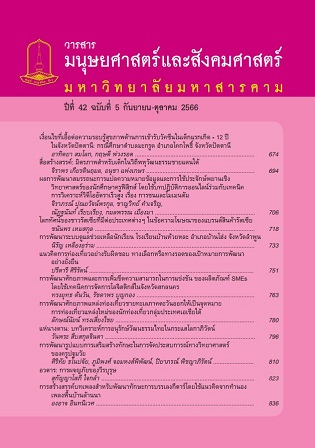แนวคิดการท่องเที่ยวอย่างรับผิดชอบ ทางเลือกหรือทางรอดของเป้าหมายการพัฒนาอย่างยั่งยืน
Main Article Content
บทคัดย่อ
บทความวิชาการนี้ มีวัตถุประสงค์เพื่อนำ เสนอแนวคิดการท่องเที่ยวอย่างรับผิดชอบที่มีการนำ มาปรับใช้ในการบริหารจัดการเพื่อความสมดุลของสามเสาหลักของมิติความยั่งยืน ทั้งนโยบายระดับชาติ นานาชาติ การออกแบบสินค้าและบริการในธุรกิจโรงแรม ร้านอาหารและธุรกิจที่เกี่ยวข้องด้านการท่องเที่ยว แนวคิดการท่องเที่ยวอย่างรับผิดชอบเป็นหนึ่งในแนวคิดการท่องเที่ยวที่มุ่งเน้นที่จิตสำนึกของผู้ประกอบการและนักท่องเที่ยว โดยสะท้อนความมีจิตสำ นึกผ่านกระบวนการการบริหารจัดการการออกแบบสินค้าและบริการ เพื่อป้องกันพฤติกรรมของผู้ประกอบการและนักท่องเที่ยว อาจส่งผลกระทบต่อสิ่งแวดล้อมและอัตลักษณ์ท้องถิ่น รวมทั้งในการออกแบบสินค้าและบริการมีการอนุรักษ์ทรัพยากร การจัดการสิ่งแวดล้อม และการจัดการที่ยั่งยืน โดยในบทความวิชาการนี้ มีการยกตัวอย่างนโยบายของธุรกิจโรงแรม และร้านอาหารที่มีการบูรณาการกระบวนการสร้างจิตสำนึกด้านสิ่งแวดล้อมประกอบกับการนำ แนวคิดการออกแบบเพื่อสิ่งแวดล้อมมาใช้ในการออกแบบสินค้าและบริการ โดยมีการรวบรวมข้อมูลเพื่อการวิเคราะห์จากนโยบายและแนวโน้มด้านการท่องเที่ยวระดับชาติและนานาชาติ
ผลการสำ รวจของบริษัทตัวแทนท่องเที่ยวระดับโลก บทความวิจัย และตัวอย่างจากภาคธุรกิจที่นำแนวคิดการท่องเที่ยวอย่างรับผิดชอบไปใช้จริงในช่วงกว่าสองทศวรรษที่ผ่านมา ทั้งนี้ การท่องเที่ยวอย่างรับผิดชอบไม่ใช่หน้าที่ของใครคนใดคนหนึ่ง แต่เป็นหน้าที่และความรับผิดชอบของทุกภาคส่วนเพื่อการไปสู่เป้าหมายการพัฒนาอย่างยั่งยืนร่วมกัน
Article Details
เอกสารอ้างอิง
กฤษณ อร่ามศรี, อนาวิน สุ วรรณะ, จิรัฐิติกาล มานะจรรยาพงศ์, กมลเกียรติ พงษ์, ทศพร ไชยประคอง,& ช่อทิพย์ นิมิตกุล. (2022). แนวปฏิบัติของวิสาหกิจชุมชนบนฐานทุนทางสังคมสู่การท่องเที่ยวอย่างรับผิดชอบใน พื้นที่สงวนชีวมณฑลแม่สา-คอกม้า จังหวัดเชียงใหม่. วารสารการพัฒนาชุมชนและคุณภาพชีวิต, 10(1), 1-10.
การท่องเที่ยวแห่งประเทศไทย. (2564). สรุปแผนปฏิบัติการการท่องเที่ยวแห่งประเทศไทยปี 2564.https://www.tat.or.th/th/about-tat/market-plan
สุพจน์ ชุณหโชติอนันต์ และธิตา อ่อนอินทร. (2560). โครงการสํารวจสถานะของเป้าหมายการพัฒนาที่ยั่งยืนในบริบทประเทศไทยและทางเลือกมาตรการทางเศรษฐศาสตร์สังคม และกฎหมายเป้าหมายที่ 12. ชุดโครงการประสานงานการวิจัยเพื่อสนับสนุนการพัฒนาที่ยั่งยืน (SDGs),
Research Coordination for SDGs. สํานักงานกองทุนสนับสนุนการวิจัย (สกว.).
Behar, H. (2007). It›s not about the coffee: Leadership principles from a life at Starbucks. Penguin.
Botero, M. E., Díaz, A. M. A., Cadavid, C. M., & Muhss, M. (2011). CSR practices in the coffee industry: A preliminary review of Kraft Foods, Nestlé and Starbucks. Negocios Internacionales, 4(2), 30-44.
Chang, K. C., Hsu, C. L., Hsu, Y. T., & Chen, M. C. (2019). How green marketing, perceived
motives and incentives influence behavioral intentions. Journal of Retailing and
Consumer Services, 49, 336-345.
Edmondson, A. C. (2012). A fuller explanation: The synergetic geometry of R. Buckminster Fuller. Springer Science & Business Media.
Elkington, J. (1998). Partnerships from cannibals with forks: The triple bottom line of 21st ‐century business. Environmental quality management, 8(1), 37-51.
Expedia. (2022). Group’s Traveler Value Index: 2022 Outlook. Expedia, Inc.
Fuller, R. B. (2009). Ideas and integrities: A spontaneous autobiographical disclosure. Estate of R. Buckminster Fuller.
Fuller, B. R. (1969). Operating manual for spaceship earth. EP Dutton & Co.
Gibson, K. L., Rimmington, G. M., & Landwehr-Brown, M. (2008). Developing global awareness
and responsible world citizenship with global learning. Roeper Review, 30(1), 11-23.
Goodwin, H. (2014). Cape town declaration on responsible tourism. https://responsibletourismpartnership.org/cape-town-declaration-on-responsible-tourism/
Goodwin, H. (2016). Responsible Tourism (2nd ed). https://www.goodfellowpublishers.com/
McFall, M., Rodehau, C., & Wofford, D. (2017). Starbucks and conservation international: How
a sustained NGO-company partnership led to the coffee industry’s first sustainability
standard. Population Council.
Mondal, S., & Samaddar, K. (2021). Responsible tourism towards sustainable development:Literature review and research agenda. Asia Pacific Business Review, 27(2), 229-266.
Palmer, J. (2002). Environmental education in the 21st century: Theory, practice, progress and promise. Routledge.
Papanek, V. & Fuller, R.B. (1972). Design for the real world. Thames and Hudson.
Renard, M. C. (2010). In the name of conservation: CAFE practices and fair trade in Mexico. Journal of Business Ethics, 92(2), 287-299.
Rodríguez-Díaz, B., & Pulido-Fernández, J. I. (2019). Sustainability as a key factor in tourism competitiveness: A global analysis. Sustainability, 12(1), 51.
Starbucks. (2022). Starbucks reports Q4 and full year fiscal 2022 results. https://investor. starbucks.com/press-releases/financial-releases/press-release-details/2022/StarbucksReports-Q4-and-Full-Year-Fiscal-2022-Results/default.aspx
Sumangkalo, P. P. (2020). Local community forest management in the Northern Region in accordance with sufficiency economy philosophy. Journal of Social Science and Buddhistic Anthropology, 5(10), 137-148.
Tourism Authority of Thailand. (2021). Responsible recovery for the tourism sector of post COVID-19 through responsible tourism concept. Tourism Authority of Thailand.
UNESCO. (2022). The UNESCO sustainable travel pledge. https://unescosustainable.travel/en/tourism-authority-thailand-supports-the-pledge
Tsai, P. H., Lin, G. Y., Zheng, Y. L., Chen, Y. C., Chen, P. Z., & Su, Z. C. (2020). Exploring the effect of Starbucks’ green marketing on consumers’ purchase decisions from consumers’ perspective. Journal of Retailing and Consumer Services, 56, 102162.
The United Nations. (2015). Transforming our world: The 2030 agenda for sustainable development. https://sdgs.un.org/publications/transforming-our-world-2030-agendasustainable-development-17981
World Tourism Organization. (2020). UNWTO regional conference on sustainable development through tourism - proceedings, Thimphu, Bhutan, 03 June 2019. UNWTO Publications.


